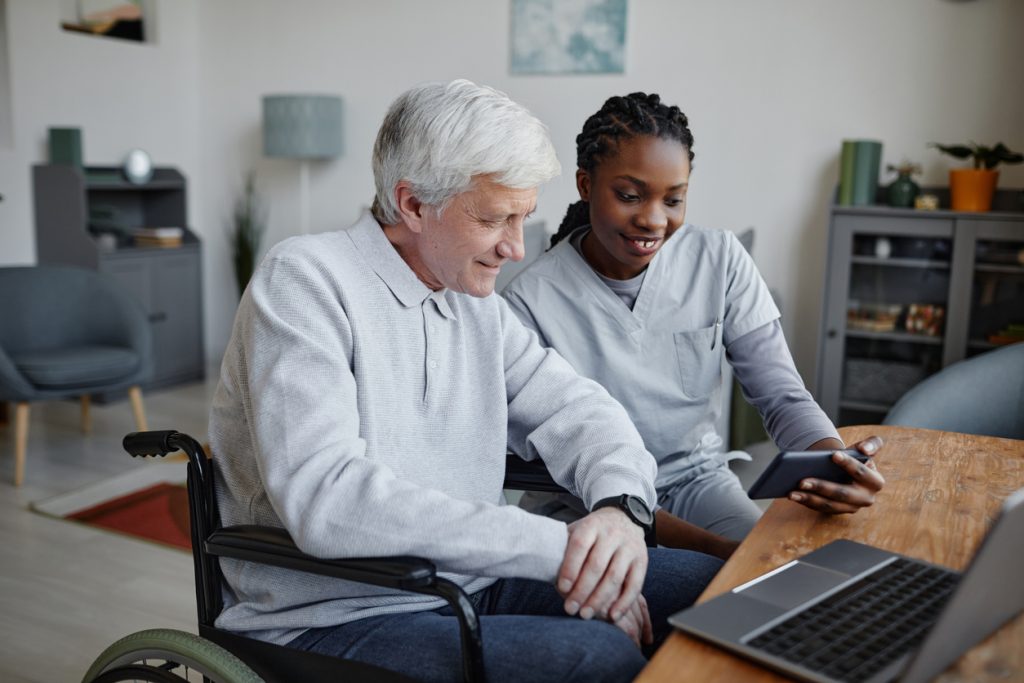Benefits offer a vital lifeline to people affected by disabilities, illnesses, or mobility issues, providing the means to maintain a greater sense of independence and freedom. In this article, we’ll explain everything you need to know about Personal Independence Payment (PIP) and how you can claim it.
In the UK, people affected by a disability, illness, or limited mobility may be entitled to benefits from the government to improve their day-to-day life, whether that’s hiring care for their needs, or to supplement their income.
What Are Personal Independence Payments (PIP)?
Personal Independence Payments (PIP) are welfare benefits to help with the extra costs associated with disability and long-term health conditions.
It is available to people with a long-term illness or disability, aged between 16 and 64 years of age.
It is split into two components- the daily living part (for help with day-to-day tasks) and the mobility part (for any help needed to get around). You may be eligible for one or both elements.
PIP is not a means-tested benefit, so you may be eligible regardless of any earnings, savings, or capital.
If you are a carer with care needs, you may also be eligible for PIP, without your carer’s allowance being affected.
By the same token, if you have a carer, claiming for PIP may actually be beneficial for their claim for carer’s allowance, and can help both your claims for council tax relief.
Who Is Eligible to Claim PIP?
The following requirements must be met in order for you to be eligible to receive Personal Independence Payments:
- Be aged between 16 – 64 years old.
- You will need to satisfy the daily living and/or mobility activities test.
- These tests must have been satisfied for at least three months and are likely to continue to do so for at least 9 months following.
- You must have no immigration conditions attached to your stay in the UK
- You must meet residence and presence conditions
If you are aged 65 or over, you will not be able to claim PIP if you have not already claimed it. Instead, you can claim Attendance Allowance. If you already receive PIP, you will continue to after turning 65.
How Much Will My Personal Independence Payment Be?
PIP has two different components:
- A mobility component: a reflection of how your condition affects your ability to get from A to B
- A daily living component: a reflection based on how your condition affects your everyday quality of life
These components are paid at either standard or enhanced rates. This is dependent on how severely limited you are in your ability to carry out daily living and mobility activities due to your physical or mental condition.
The daily living component aims to help with everyday activities, such as washing, bathing, dressing, preparing food, and managing your medicines.
The mobility component provides support if you need help getting around- be it physically moving around, or even leaving the home. You do not need a physical disability to be eligible for this component- mental or cognitive disabilities that can impair your capacity (such as anxiety) may also be eligible.
The current 2025 Personal Independence Payment rates are:
Daily living part: £73.90 (lower weekly rate) £110.40 (higher weekly rate)
Mobility part: £29.20 (lower weekly rate) £77.05 (higher weekly rate)
Your entitlement is based on how your condition affects your life, not the condition itself.
If you have a terminal illness and are not expected to live for more than six months, you should automatically receive the highest band of daily living benefits (the mobility part will depend on any level of help you need in this regard).
Is My Eligibility Affected If I Receive Other Benefits?
Receiving other benefits will not impact your eligibility for PIP, except for the following exclusions:
- Armed Forces Independence Payment
- Constant Attendance Allowance (you will be entitled to less of the daily living component)
- War Pensioners’ Mobility Supplement (will affect the mobility part but you will still be able to get the daily living component)
How to Make a Claim
To make an initial claim for PIP, you will need to call the Department for Work and Pensions on 0800 917 2222.
During this phone call, you will need to provide the following information:
- Full name and date of birth
- Address
- Phone number
- National Insurance number
- Bank or Building Society details
- GP details
- Information about any recent hospital stays, care homes, or hospices
- Any time that you have spent out of the country
- Your nationality and immigration status.
What Happens Next Then?
- After providing your initial information, you’ll be sent a “How Your Disability Affects You” form to complete.
- You will then be asked to attend an in-person medical assessment. (It is useful to bring any relevant supporting evidence from your GP or health worker.)
- You will then receive a letter with a decision based on your information and assessment. If eligible, this will include the level of support that you can access and when future reviews of your condition will be made.
Can I Challenge the Decision?
Yes, if you disagree with the decision, you may ask for a mandatory reconsideration to review your case. If this is the case, it is advisable to write to the DWP within a month of receiving your decision.
If you again disagree with this review, you can ask for a tribunal (again, preferably, within one calendar month of the decision).
What if My Circumstances Change?
If your circumstances change- including moving home or changes in your condition- you are obligated to notify the PIP team on 0800 917 2222. Failure to do so may result in penalties or, in extreme cases, legal action.
How Long Does the Application Process Take?
The length of time is typically anywhere from 15-20 weeks, although it can vary considerably as a result of a variety of additional factors:
- The size of the current application backlog and the time of year
- The complexity of your case and the level of detail required
- The accuracy and relevance of the information you have provided
- The fact that your circumstances may change during the course of your application
The bureaucracy and red tape involved may be frustrating, but the system is designed to help you, not hinder you. If in doubt, use your application reference number to request an update and to clarify whether or not you need to supply any additional information.
Can You Get Help With A PIP Application?
Yes, there is a supplementary part of the application form that you can fill in if you are having a friend or relative complete the form on your behalf. This could be due to issues with your sight, physical impairment, or mental health issues. There are no restrictions on the reason why someone can help you to complete the form, only that you must feel comfortable with allowing them to do so.
Do You Have To Pay To Apply For PIP?
Not only do you not have to pay anything, but you should not feel pressured into hiring a service that claims to be able to help expedite or strengthen your application. PIP is always free to apply, and the forms and supporting documentation you will be provided with will guide you through everything you need to know. If in doubt, contacting Citizens Advice for free, independent advice is always better than paying for an unnecessary service.
Do I Need Insurance?
Surewise can help you put Direct Payments Insurance in place for added protection and peace of mind. Connect with us today, and we will guide you through everything you need to know without delay.








